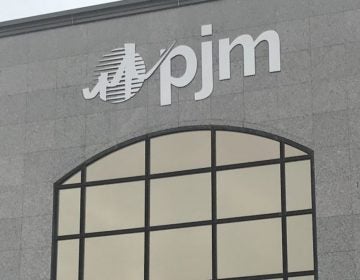First look at New Jersey’s state takeover plan for Atlantic City

(AP Photo/Wayne Parry)
As Atlantic City teetered on the edge of a possible bankruptcy last month, Mayor Don Guardian, Gov. Chris Christie and Senate President Stephen Sweeney came together in Trenton and declared they were in agreement on a plan for the state to take on sweeping powers so it could cut the cost of the city’s government and avoid a financial collapse. They avoided using the word “takeover” — it would be an “intervention” or a “partnership,” they said.
But the proposal that Sweeney (D-Gloucester) offered this week appears to be a takeover after all, an unprecedented seizure of power from the city’s elected government. Mayor Don Guardian lashed out against the plan, saying the city had been “stabbed in the back” and excluded from decision-making. Sweeney in turn accused the city of asking for financial help while refusing to make needed structural changes.
A Senate press release maintains that the bill “would allow the city to retain its decision-making authority and make the needed reforms unless the state’s local governing board acts to take control of the functions,” and would give the city time to make its water authority more profitable.
However, while the actual legislation has not been introduced yet, a draft copy indicates the measure is designed to give broad authority over city operations to the director of the state’s Division of Local Government Services (DLGS).
The agency’s Local Finance Board could grant the director “any of the functions, powers, privileges, and immunities of the governing body” for up to five years, the draft says. He could veto council minutes, unilaterally change labor agreements, hire and fire employees, and authorize bond ordinances, among other powers.
The bill appears “exceptionally harsh, and compared to other interventions the state has made in the past, you could call it draconian in its approach,” said Marc Pfeiffer, assistant director of the Bloustein Local Government Research Center at Rutgers and a former DLGS deputy director. “That said, we also haven’t seen a problem like this, which itself is very extreme, and does warrant for the state to have additional authority beyond what we’ve done in the past.”
The press release also says that if the city does not find a way to generate more cash from its Municipal Utilities Authority within a year, the state could sell the agency. Guardian has said that New Jersey American Water and its lobbyist Philip Norcross, brother of South Jersey political boss George Norcross, have expressed interest in buying the authority.
The utility has been described as worth $100 million in a sale, but private ownership would deprive the city of control over an important asset and lead to higher water rates for customers, said Jim Walsh, mid-Atlantic region director for Food & Water Watch and a privatization foe.
“It’s hard for me to not see the current takeover as being specifically done to force the sale of Atlantic City’s water,” Walsh said. “The mayor and council don’t want to do it. The residents don’t want to do it. The takeover would clearly move the residents out of the way and silence their voice in the decision.”
Sweeney and bill cosponsors, Sen. Paul Sarlo (D-Bergen) and Sen. Kevin O’Toole (R-Essex), are also proposing another measure that would create a payment-in-lieu-of-taxes (PILOT) program for the city’s casinos. Instead of property taxes, the casinos would pay the city $120 million a year, plus an additional amount starting at $30 million and decreasing over time. Christie has twice vetoed similar bills.
A ‘more direct role’ for state
The new plan is the latest version of an evolving effort to resolve the crisis in Atlantic City, which saw four of its 12 casinos close in 2014. Thousands of people lost their jobs and the erosion of the city’s tax base accelerated.
In addition, a number of casinos have won tax appeals against the city, contributing to a nearly $400 million debt load. The city anticipates deficits of $300 million over the next five years. Its debts include $170 million to the Borgata casino, which refused to make a $7 million tax payment last week while the two sides negotiate a settlement.
“The city’s fiscal crisis is severe and immediate,” Sweeney said in the press release. “Property values have plummeted, the foreclosure rate is the highest in the country and unemployment is greater now than during the recession. The state has to take a more direct role with more effective solutions.”
Christie attempted to address the crisis in 2014 by holding emergency summit meetings in Atlantic City, creating a high-profile commission to examine the city’s finances, and appointing emergency managers last year to suggest cost-cutting moves.
Guardian cut the city workforce by 300 and reduced the annual budget by $25 million, but an emergency manager said the city needed to act with much greater urgency to get its fiscal house in order.
A package of bills passed by the Legislature last year attempted to stabilize city finances by having casinos make annual PILOT payments of $120 million for 15 years, which would have also ended the threat of new tax appeals. Other bills aimed to boost school aid and to redirect two pools of money — tourism marketing funds and a casino tax used to bankroll redevelopment efforts — for city debt relief.
Christie conditionally vetoed the PILOT bill in November. The Legislature passed it with his requested changes but last month he vetoed it again, saying Atlantic City had failed to rein in its “excessive spending” and should not get a bailout. With the city in danger of running out of money by April, Sweeney co-sponsored a takeover bill, S-970, to speed up the restructuring of city government Christie was demanding.
Guardian, meanwhile, said he was considering filing for bankruptcy. However, New Jersey has not seen a municipal bankruptcy since the Depression, the state was unlikely to approve such a move, and it was unclear that it would help anyway. The mayor backed down, and at the press conference with Christie and Sweeney, said he would accept a state partnership; he has since said he was assured it would fall short of a full takeover. Sweeney withdrew S-970 and began drafting a new version, which he announced this week.
Pressure to privatize
Sweeney’s legislative approach originally focused on the PILOT bill and accompanying financial stabilization package, but in the face of Christie’s resistance to that strategy he adopted a more aggressive stance on reforming Atlantic City.
In a WHYY radio interview earlier this month, Sweeney said the city needs to cut its budget by $100 million, or nearly a third, and said the PILOT bill would have given Guardian two years of breathing room to make changes. Christie’s vetoes have shortened that schedule, the Senate president said.
“Don Guardian is a good friend of mine, and I think he has worked very hard to try to right the ship here,” Sweeney said. “But the things we need to do need to go further.”
Sweeney, a former freeholder director in Gloucester County and a vocal advocate of county-wide shared services, said he favored a regional approach. Atlantic County could use its good bond rating to give the city affordable access to the bond markets and help it refinance its debt, he said. But County Executive Dennis Levinson recently rejected a suggestion that the county pay off the Borgata debt.
The county could also help the city take better advantage of its existing assets, Sweeney argued.
“The big discussion is around their water company,” he said. “The county could come in and purchase or lease the water company, and provide needed cash to Atlantic City, and make money from running the water company, like a business.”
Sweeney said he was also open to a plan by Atlantic City to dissolve its Municipal Utilities Authority and take direct control of the water agency, which officials say could yield $5 million a year in revenues. On Wednesday the city council reportedlyput off a vote on the agency’s future for 90 days, with the MUA head saying he wanted seek private investment in the utility while keeping it independent.
Investments in utilities sometimes take the form of a public-private partnership such as a long-term lease. In 2012, for example, the Bayonne Municipal Utilities Authority agreed to hand its operations over to United Water for 40 years. Proponents say private operators are better able to charge the rates needed to upgrade aging infrastructure, while critics say deals with profit-making companies are bad for customers and communities.
“The concession agreement is essentially a high-interest loan, because it’s not free money,” said Jim Walsh of Food and Water Watch. “The concession agreement needs to be paid back with interest, and that interest is then paid by ratepayers. So it’s really a shell game of just moving the money around and allowing these private water companies to skim off the top. Those resources could be better invested in Atlantic City and the infrastructure there.”
Sweeney’s bill package does not require Atlantic City to sell or lease the water utility. But Walsh said he was concerned that its structure, with the PILOT bill offered as a separate measure, could ratchet up pressure for privatization and other extreme measures.
“The governor may veto the PILOT bill, which he’s done in the past, and only move forward the takeover bill, which would mean that the Local Finance Board’s moves would be even more draconian without any support coming in for Atlantic City,” Walsh said. “The dissolution of union contracts and collective bargaining agreements, the sale of the water system, all these things, become even more likely scenarios.”
_____________________________________________________
NJ Spotlight, an independent online news service on issues critical to New Jersey, makes its in-depth reporting available to NewsWorks.
WHYY is your source for fact-based, in-depth journalism and information. As a nonprofit organization, we rely on financial support from readers like you. Please give today.




